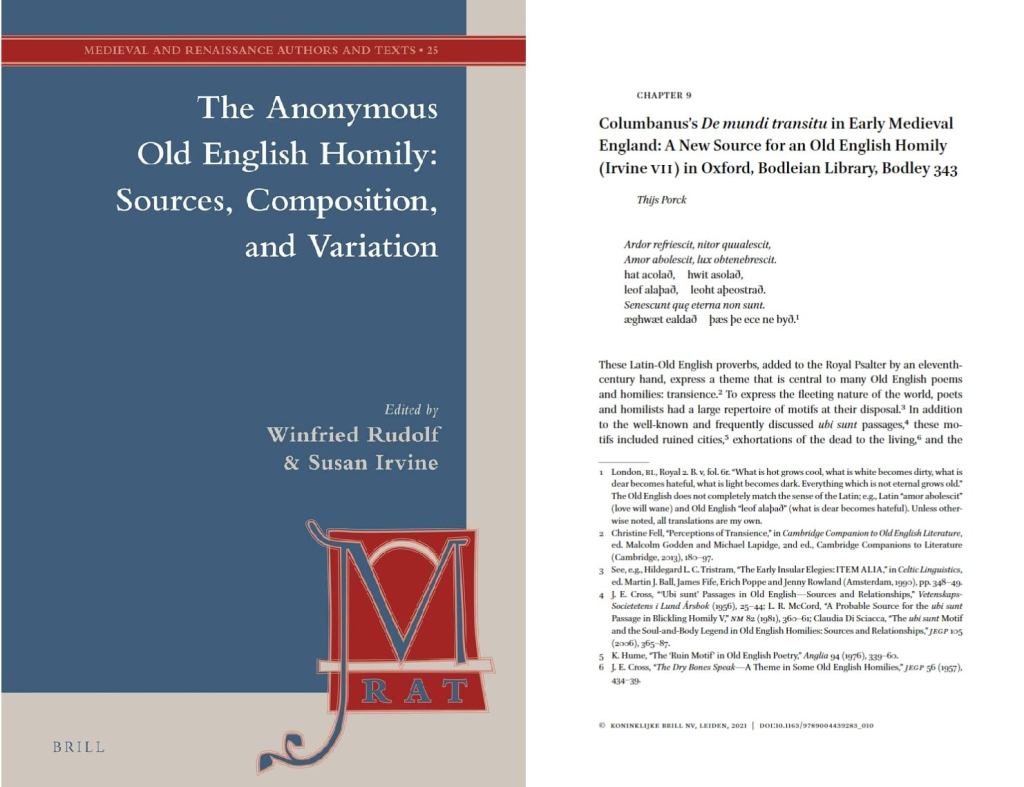In the 9th century, an anonymous scribe copied a poem attributed to the Irish missionary Columbanus (540-615) and made a crucial mistake. He accidentally omitted one line from the poem. Since this 9th-century manuscript is the only extant copy of the 120-line poem, modern editors of the poem have been forced to leave this line in the poem blank. This blog post reports on the fact that this missing line has been found(!), as I reveal in a new Open Access publication (see the link available at the end of this blog post).
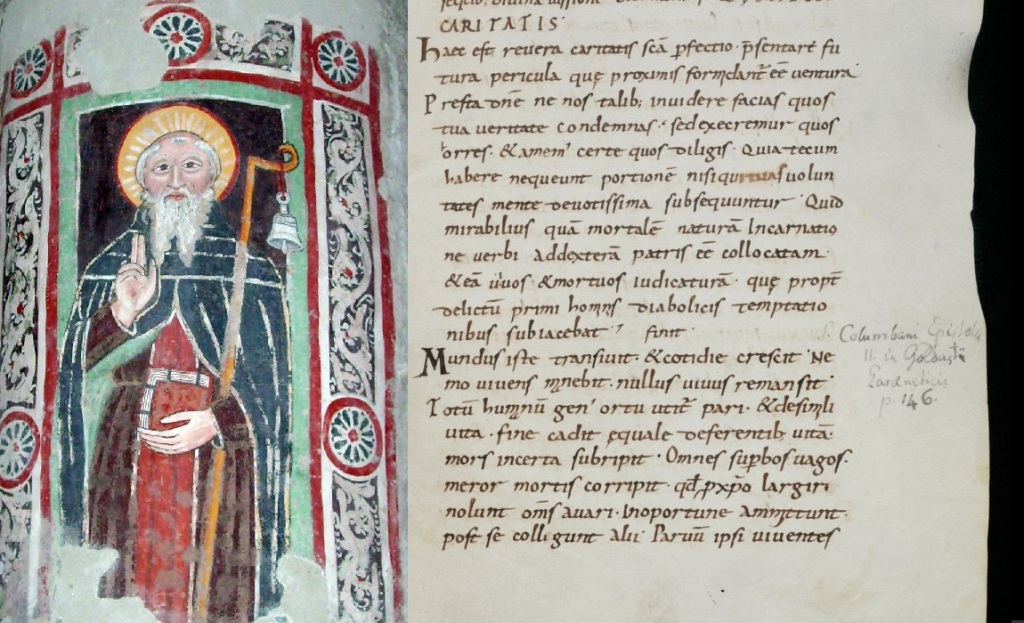
A missing line in Columbanus’s De mundi transitu
The Irish missionary Columbanus (540-615) founded monasteries in France and Italy and was also known to have written pieces in verse. His De mundi transitu is a short but highly wrought poem, written in a style that is typical for Hiberno-Latin poets of the early Middle Ages. It consists of 120 heptasyllabic lines, divided into thirty stanzas of four lines each. In addition to rhyme, which occasionally extends to three syllables, the poem also features alliteration. The topic of the poem is the fleeting nature of earthly delights; everything that is joyful in this life (beauty; wealth; youth) passes:
Cottidie decrescit
Vita praesens quam amant;
Indeficiens manebit
Sibi poena quam parant.[The present life that they love declines daily; the penalty they prepare for themselves remains unfailingly.]
Columbanus, “De mundi transitu”, ll. 21-24.
Therefore, Columbanus (540-615) holds, a true Christian should focus on the permanence found in Heaven.
This beautiful and powerful poem survives in only one manuscript, which was copied in the 9th century in the Abbey of Saint Gall, Switzerland. When the 9th-century scribe copied the poem, he made a crucial error. Rather than copying line 106 of the poem, his eyes skipped across the page of his exemplar and he accidentally copied out the last part of the wrong line: line 102, which now occurs twice in the manuscript, but does not make any sense in the second instance (a description of Heaven):
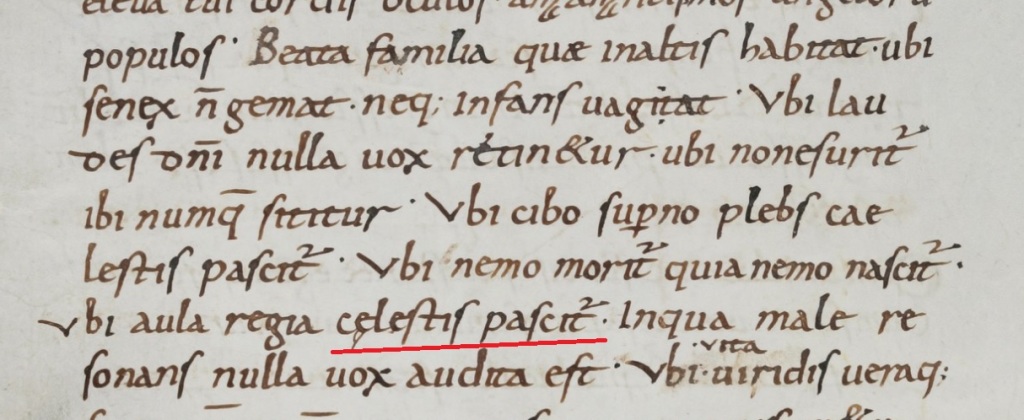
Ubi cibo superno
Plebs caelestis pascitur,
Ubi nemo moritur
Quia nemo nascitur,
Ubi aula regia
caelestis pascitur
In qua male resonans
Nulla vox audita est[Where on celestial food the heavenly folk are fed; where no one dies because no one is born; where the royal hall the heavenly … are fed, in which no voice is heard resounding evil]
Columbanus, “De mundi transitu”, ll. 101-108.
The erroneous repetition of part of line 102 on the place of 106 may have been triggered by the fact that both lines 101 and 105 start with the same word: ‘Ubi’. The scribe did not notice their mistake, but later editors of the poem, who could only rely on this faulty manuscript, have been forced to leave open line 106 or come up with their own lines. However, during my research, I chanced upon a partial copy of Columbanus’s poem in another manuscript, which contains the missing line 106! But before I can talk about that part of the story, I need to talk about the fact that old people do not groan in Heaven.
Heaven is a place where the old man does not groan
When I read the poem De mundi transitu for the first time, I was struck by one of its descriptions of Heaven. According to Columbanus, Heaven is a place “Ubi senex non gemat, / Neque infans vagiat” [where the old man does not groan and the infant does not cry]. In my research into early medieval ideas about old age, I found that Heaven was typically described as a place where old age was absent (see Heaven is a place without old age: Age and the afterlife in early medieval England) and I knew of only one other text that described Heaven in the same terms as Columbanus had done: an anonymous Old English homily, found in a twelfth-century manuscript. This Old English text described Heaven as a place “þær eald ne graneð, ne child ne scræmeð” [where the old one does not groan and the child does not scream]. The phrasing was eerily similar to Columbanus’s De mundi transitu and, upon closer investigation, I found that the Old English homily featured a near-translation of some fifty lines of the poem – something that no one else had noticed!
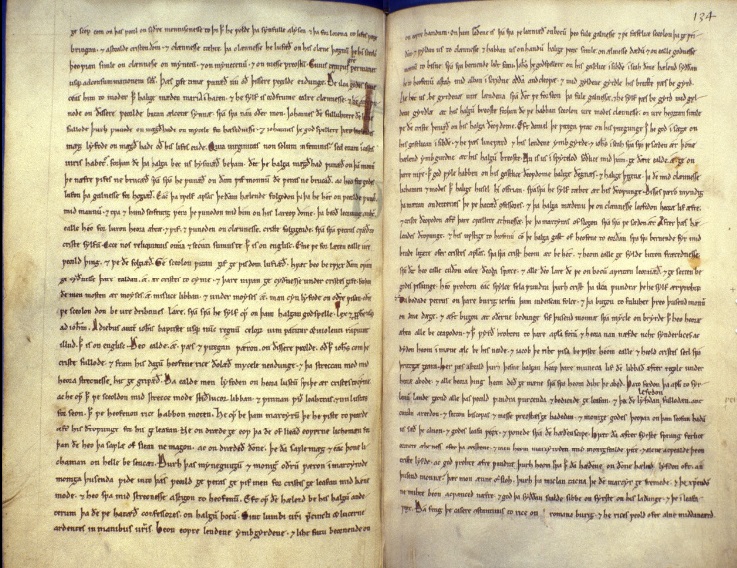
Finding a Latin source for an Old English text is rare and such a substantial one offers all sorts of opportunities for research (how did the Old English homilist adapt his source; what did he leave out; what did he add, etc.) – I was able to write a 23-page chapter about this find (see the link to the full article below). Unfortunately, the Old English homilist did not include a literal translation of the last lines of Columbanus’s poem (including line 106). He did give a near-literal translation of lines 103 and 104 (“Ubi nemo moritur / Quia nemo nascitur”) as “ne þær nan ne swæltæð, for þam ðe þær ne byð nan acenned” [where no one dies, because no one is born there], but what follows seems more of a paraphrase. However, whilst researching this homily and the poem, I found additional and crucial traces of the missing line 106 of Columbanus’s De mundi transitu.
Since I wanted to make sure that the Old English homilist had not used another Latin text as its source, I did some detective work to see if any other texts mentioned old people not groaning in Heaven (and various other phrases found in both Columbanus’s poem and the Old English homily). When I searched for variants of the line “ubi senex non gemat” [where the old man does not groan] in an online database with medieval Latin texts (Brepols’s Library of Latin Texts), I found a text that contained a version of that line, along with some fourteen other lines of Columbanus’s De mundi transitu, including (YES!) line 106 – it turned out to be the work of another person from Ireland: Sedulius Scottus.
An Irish teacher’s notebook: Sedulius Scottus’s Collectaneum Miscellaneum

Sedulius Scottus (fl. 840-860) was a 9th-century Irish teacher, scribe and poet, who fled Ireland after the Viking raids and ended up in continental Europe, where he certainly stayed in Liège (present-day Belgium) and later possibly moved to Milan (Italy). Scottus wrote various works, including poems and biblical commentaries. One of his works, commonly referred to as the Collectaneum Miscellaneum, is a collection of quotes from mostly biblical and patristic sources (a florilegium). For some passages, names of source authors have been added in the margins of the manuscript, but the origin of some strings of text in Scottus’s notebook are still unknown. On one of the pages of his notebook, Sedulius included some lines of Columbanus’ poem De mundi transitu. The passage from Columbanus’s poem was included between two quotes from Church Father Augustine (354-430) and the entire passage is attributed to ‘AVGVSTINVS’ in the manuscript of the Collectaneum:
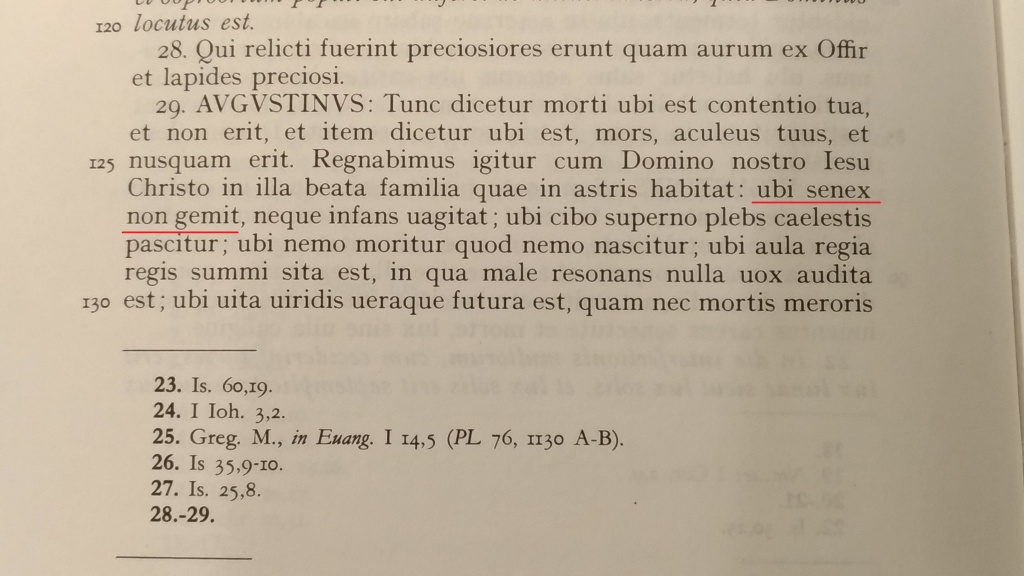
The misattribution to Augustine of the entire passage (the lines from Columbanus are located in between two Augustinian quotes) has probably resulted in this passage having gone unnoticed in the scholarship on Columbanus’s De mundi transitu. This is unfortunate, since Sedulius Scottus seems to have had access to a copy of the poem that was complete, or, at the very least, did contain line 106 that is missing from the only extant 9th-century manuscript of the full poem!
Here are the lines from the poem in the 9th-century manuscript (without line 106) and the equivalent lines in Sedulius Scottus’ notebook (with line 106!):
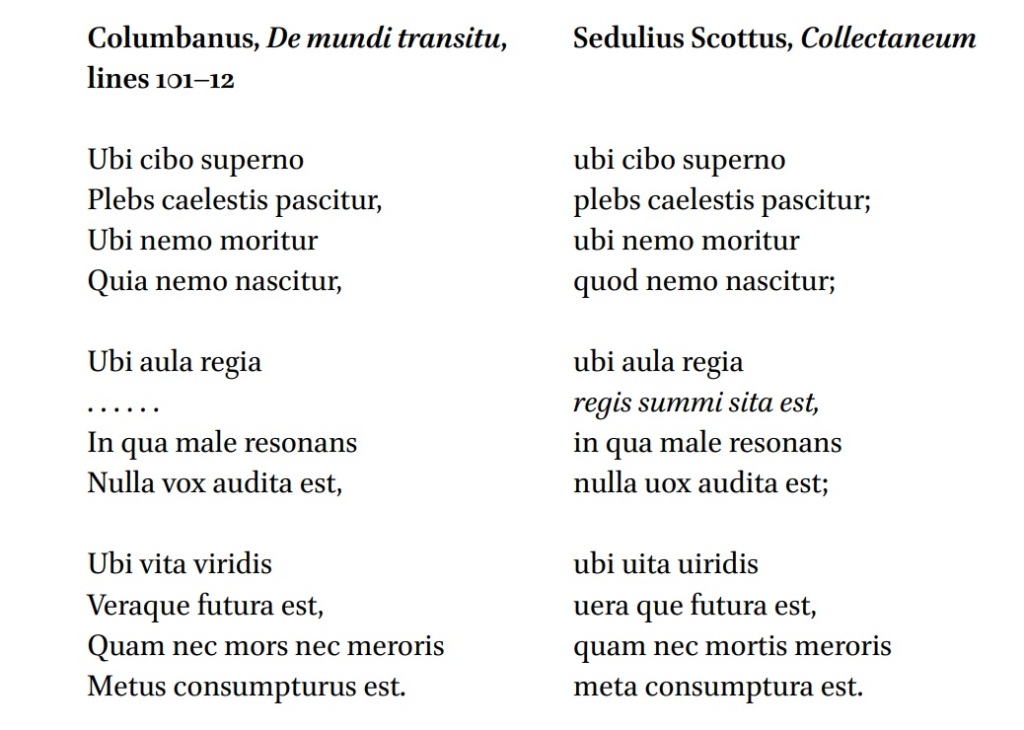
It looks as if Sedulius Scottus decided to copy out the lines from Columbanus’s poem that describe Heaven and, crucially, Sedulius’s version of the poem does not appear to have had the scribal error of the 9th-century manuscript from Saint Gall. His version of lines 105-108 read “Ubi aula regia / regis summi sita est, / in qua male resonans / nulla uox audita est”, the meaning of which makes perfect sense: “Where the royal hall of
the highest king is located, in which no voice is heard resounding ill”. The line “regis summi sita est” is also a perfect fit with the rest of Columbanus’s poem – it has seven syllables (like all the other lines), there is alliteration with the last word of line 105 (“regia / regis”) as well as alliteration within the line it self (“summi sita”); and it rhymes with line 108 (“sita est […] audita est”). In other words, it is very likely that the line “regis summi sita est” indeed belonged to the original poem by Columbanus! Thus, by sheer chance and some detective work, the line that was lost by the carelessness of a 9th-century scribe in Saint Gall can now be restored and Columbanus’s poem is once more complete!
For a more thorough, sourced and nuanced discussion of this find, as well as the relationship between Columbanus’ poem De mundi transitu and the anonymous Old English homily you can now read my Open Access (i.e. freely available) publication “Columbanus’s De mundi transitu in Early Medieval England: A New Source for an Old English Homily (Irvine VII) in Oxford, Bodleian Library, Bodley 343” (click the link). This chapter is part of the book The Anonymous Old English Homily: Sources, Composition, and Variation, ed. Winfried Rudolf and Susan Irvine (Brill, 2020). I am currently working on a new critical edition and translation of Columbanus’s De mundi transitu, which will have the missing line filled in!
